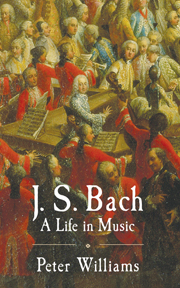Book contents
- Frontmatter
- Contents
- Preface
- Acknowledgments
- Map of Northern Germany in the time of J. S. Bach
- Map of Thuringia and Saxony in the time of J. S. Bach
- 1 Early years 1685–1703
- 2 First appointments 1703–8
- 3 Weimar 1708–17
- 4 Cöthen 1717–23
- 5 Leipzig, the first years
- 6 Leipzig, the middle years
- 7 Leipzig, the final years
- 8 Observations, descriptions, criticisms
- Epilogue
- Postscript
- Glossary
- List of references
- Index of works (BWV)
- Index of names
Epilogue
Published online by Cambridge University Press: 10 December 2009
- Frontmatter
- Contents
- Preface
- Acknowledgments
- Map of Northern Germany in the time of J. S. Bach
- Map of Thuringia and Saxony in the time of J. S. Bach
- 1 Early years 1685–1703
- 2 First appointments 1703–8
- 3 Weimar 1708–17
- 4 Cöthen 1717–23
- 5 Leipzig, the first years
- 6 Leipzig, the middle years
- 7 Leipzig, the final years
- 8 Observations, descriptions, criticisms
- Epilogue
- Postscript
- Glossary
- List of references
- Index of works (BWV)
- Index of names
Summary
CONCERNING THE LIFE
One oddity of the Obituary, especially when compared to Mainwaring's biography of Handel, is how rarely it refers to other people, particularly musicians. While contributing to the picture of a self-reliant musician, this has a distancing effect, leaving much out of focus. Other documentation does go some way to improve this focus, but there being such limits to the documentary evidence, Bach's admirers have long had scope for all kinds of speculation, and this book can not be free of it.
Except for the young orphan's anguish at losing his manuscript and the mature composer's regrets at losing his beloved ex-employer, the only fully personal remark in the Obituary occurs when Emanuel speaks of his father's ‘blissful marriage’ to Maria Barbara and the ‘severest pain’ at her death. But, in picking on this, is he expressing his own feelings as her son, glossing his memory as a six-year-old, perhaps Friedemann's as a nine-year-old? Or quoting his father from later years, putting words into his mouth, desiring to speak well of both parents? Or he is speaking the simple truth? There are difficulties in accepting the last because the remark involves Emanuel himself, but it then leads to a further and intriguing question: in keeping alive, in an obituary, the memory of the composer's first wife and family, is he hinting something about the second?
- Type
- Chapter
- Information
- J. S. BachA Life in Music, pp. 358 - 374Publisher: Cambridge University PressPrint publication year: 2007

